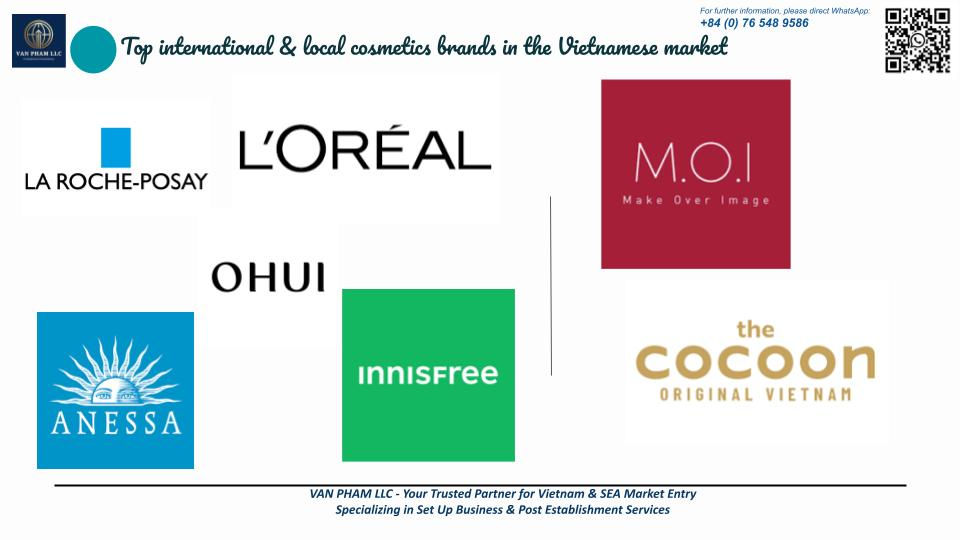Strategic Expansion Opportunity: Tap into Vietnam’s Fast-Growing Cosmetics Market
- Van Pham LLC

- Jun 3, 2025
- 3 min read
Vietnam’s beauty and personal care market is on a powerful growth trajectory, offering exciting opportunities for international cosmetics brands looking to expand in Southeast Asia. Valued at over USD 2.4 billion in 2024, the market is projected to reach USD 2.7 billion by 2027, driven by a young, urbanized population, rising incomes, and increasing digital adoption. With 86% of Vietnamese women regularly using cosmetics and a thriving e-commerce ecosystem led by platforms like TikTok, Shopee, and Lazada, Vietnam has become a highly dynamic, digital-first market where beauty brands can thrive — especially those offering natural, organic, and affordable premium products.

Why Vietnam is a Prime Cosmetics Market
Strong Market Growth
Vietnam’s cosmetics market, valued at over USD 2.4 billion in 2024, is forecast to reach USD 2.7 billion by 2027, reflecting a CAGR of 3.3%. According to Nielsen, the average Vietnamese woman spends about VND 500,000–700,000/month (~USD 20–30) on cosmetics, and this figure continues to grow.
Rising Beauty Consumption
A substantial 86% of Vietnamese women now use cosmetics regularly, up from 76% in 2018. Makeup accounts for 60% of this consumption. Over 50% of women aged 22+ are frequent users, representing a well-educated, urban, and career-oriented demographic.
Digital-First Consumers
Platforms like TikTok, Shopee, and Lazada dominate Vietnam’s beauty e-commerce landscape. As of late 2023, 73% of cosmetics purchases were made online. From January to October 2023 alone, online beauty sales reached VND 22.2 trillion (~USD 900 million), a 74% YoY increase.
Favorable Demographics
Vietnam is in a "golden population" period, with women comprising 50.1% of its 100+ million citizens. This youthful population is increasingly conscious of beauty, wellness, and sustainability.
Growing Demand for Natural & Organic Products
Consumers are shifting toward clean, chemical-free, and sustainably sourced products. Ingredients like coconut oil, turmeric, and aloe vera are especially popular.
Competitive Landscape: International Brands Lead
Foreign Brands Dominate
International players such as La Roche-Posay, d'Alba, The History of Whoo, Ohui, Dear Klairs, Anessa, Skin1004, Simple, Laneige, Innisfree, and L'Oréal dominate the skincare segment. Most operate flagship stores (Shop Mall) on platforms like Shopee and Lazada, increasing their visibility and consumer trust.
Domestic Players
Vietnamese brands hold only 10% of the market, primarily in the budget segment. While many lack modern production facilities or R&D capabilities, new brands are emerging with innovative, locally inspired offerings:
Legacy Brands: Thái Dương, Thorakao, Miss Sài Gòn, Lanna, Xmen, Biona
New Generation Brands:
M.O.I Cosmetics – Celebrity-founded, makeup-focused
Cocoon – Vegan and clean beauty
Cỏ Mềm Homelab, Cỏ cây hoa lá, Nau Nau – Natural formulas
Lemonade – Strong online brand; dominates the eyebrow pencil category (60.7% share)

Market Entry Challenges & Considerations
90% of cosmetics are imported, but local competition is increasing.
Price sensitivity remains a major factor, even as quality and authenticity are highly valued.
Digital marketing, social commerce, and influencer engagement are crucial for differentiation.
Opportunities for Foreign Cosmetics Brands
Distribution and Market Penetration
There is a robust demand for international skincare and personal care products, especially from Korean, Japanese, and French brands. Consumers trust official flagship stores on Shopee, Lazada, and Tiki.
Production & Localization
Vietnam’s low labor costs and proximity to ASEAN markets make it attractive for manufacturing. Opportunities exist for OEM partnerships with emerging local brands.
E-Commerce-Led Growth
Vietnam is an ideal market for digital-first strategies. Livestreaming, influencer marketing, and TikTok-led campaigns are highly effective for customer acquisition and conversion.
Regulatory Advantage
Thanks to multiple free trade agreements, import duties on cosmetics range from 0–20%, depending on product origin. This provides a favorable entry point for international brands.
High-Potential Product Segments
Organic Skincare: Products with coconut oil, turmeric, and aloe vera.
Affordable Premium Lines: Priced between VND 200,000–500,000 (~USD 8–20), which appeals to middle-income consumers.
Vegan & Sustainable Brands: Clean beauty trends are especially popular among Gen Z and millennials.
Conclusion: Seize the Moment
Vietnam’s cosmetics market is not only expanding in value but also evolving in complexity. Clean beauty, e-commerce dominance, and influencer-led marketing are reshaping consumer expectations. Although competition is intensifying — particularly from Korean and Chinese brands — global players that act swiftly and strategically can secure early loyalty and long-term market share.
To succeed, foreign cosmetics brands must embrace local partnerships, optimize digital channels, and deliver authentic, high-quality offerings that resonate with modern Vietnamese consumers. The time to invest in Vietnam is now. Brands that enter early and understand the local market dynamics will be best positioned for long-term growth.
DISCLAIMER: This content provides business news and legal insights for information purposes only. It is not intended, and should not be construed as, legal consultancy. We make every effort to ensure the accuracy and completeness of the information presented, but the information may be subject to change without notice due to Government policies or updates beyond our control. For further and comprehensive advice, please do not hesitate to contact us.
Reference Sources:
.jpg)



Comments